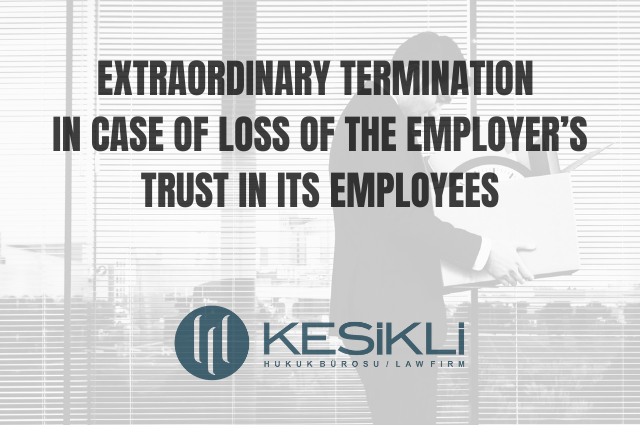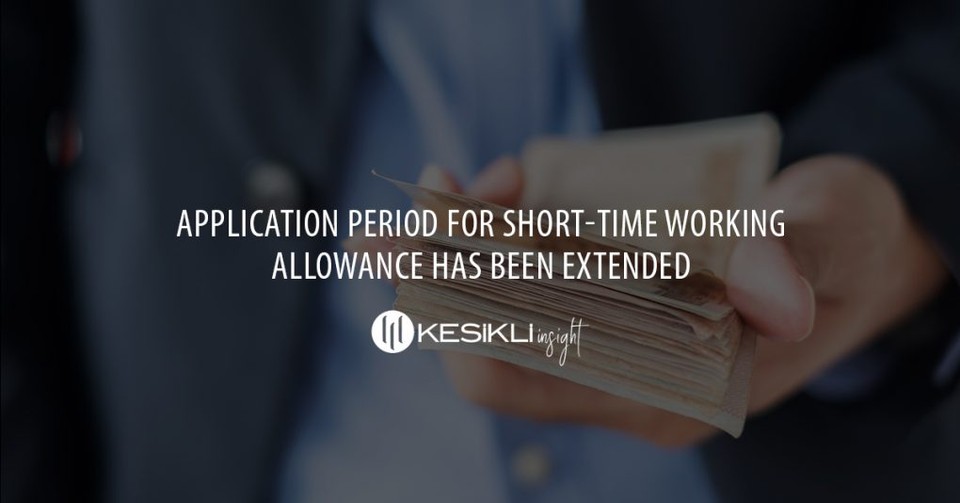COVID-19 Pandemic’s Impact on Employment Contracts
Having spread to most of the countries and identified as a pandemic by the World Health Organization, COVID-19 is substantially affecting the global markets as well as Turkey.
Extraordinary measures have been taken not only by governments and authorities but also by the private companies. Some of employers are obliged to close their workplaces due to governmental requirements and some of them closed their workplaces without any formal requirements.
We aim to address the respective rights and obligations of the parties in an employment contract in relation to COVID-19 which is defined as an infectious disease under Turkish Law and its effects on the employment contracts herein.
1.Employer’s Obligations
1.1 Employer’s Obligation to Inform Infectious Diseases
COVID-19 is regarded as an infectious disease under Infectious Diseases Regulation dated 2007. According to the Regulation, the employers are obliged to notify health institutions if any employee is infected with COVID-19.
1.2 Employer’s Obligation to Provide Occupational Health and Safety
Turkish Code of Obligations No. 6098 (“Turkish Code of Obligations”) and Occupational Health and Safety Code No. 6331 (“Occupational Health and Safety Code”) require the employers take necessary precautions and provide the employees with necessary equipment and materials in order to ensure occupational health and safety at the workplace.
In this vein, employers are required to ensure hygiene of the workplace and provide necessary equipment and materials such as masks, cleaning materials etc. and take necessary measures in order to ensure health and safety of the employees by taking COVID-19 into consideration in terms of its dangers and infectiousness.
2. Termination of Employment Contracts
2.1 Termination by the Employee
2.1.1 Termination of the Employment Contracts Based on Justified Grounds by the Employee due to Employer’s or other Employees’ infection with COVID-19
Depending on the particulars of the matter, employees would have the right to terminate their employment contracts immediately as per Turkish Labour Act Article 24/I/b if an employee or the employer is infected with COVID-19. It should be noted that the employee will only be entitled to immediate termination of the contract based on justified grounds if the employee is working closely with the employer or employee who is infected with COVID-19.
Employees will not have the right to terminate their employment contracts based on under Turkish Labour Act merely because the employee himself/herself is infected with COVID-19 according to the precedents.
2.1.2 Termination of the Employment Contracts Based on Justified Grounds by the Employee due to Compelling Circumstances under Labour Act
Compelling circumstances may be defined as external occurrences that are unforeseeable by the parties to an employment contract according to Labour Act. In the event of compelling circumstances, the employee may terminate the employment contract based on justified grounds according to Labour Act Article 24/III which is read as follows:
“If compelling circumstances arise which cause suspension of works for more than one week at the workplace, the employee may terminate the employment contract based on justified grounds, without complying with the term of the contract and notice periods.”
Quarantine restrictions or entry prohibitions on the workplace for more than one (1) week due to COVID-19 epidemic may be regarded as a compelling circumstance. It should also be noted that employers are obliged to pay half wages of the employees for the one (1) week period according to Labour Act Article 40.
2.1.3 Termination of the Employment Contracts due to Failure of the Employer to Take Necessary Measures with respect to COVID-19
Employees may request the employer to take necessary measures in terms of Occupational Health and Safety Code with respect to COVID-19. If the employer does not address the health and safety requests of the employees, the employees may refrain from working until health and safety measures are fulfilled by the employee subject to Occupational Health and Safety Code Article 13. The employer may choose to offer the employee another job which is complying with health and safety requests of the employee. If the employee rejects this offer of the employer, the employer may have the right to terminate the employment contract based on justified grounds as per Labour Act Article 25/II/(e).
The employee may have the right to terminate the employment contract based on the employer’s failure to take precautions despite employee’s request according to Labour Act Article 24/II/(f). Labour Act Article 13/2 provides that statutory and contractual rights of the employee who refrains from work due to failure of the employer to take health and safety measures will continue to exist within the time period the employee refrains from work. Therefore the employers should pay wages and additional payments accordingly and insurance premiums of the employee in the event of a refrainment from work by an employee.
2.2 Termination by the Employer
2.2.1 Termination of the Employment Contracts Based on Justified Grounds by the Employer due to Compelling Circumstances under Labour Act
According to the relevant legislation and precedents, the employee may have the right to terminate the employment contract based on justified grounds immediately if quarantine period due to epidemic illnesses exceeds one (1) week and constitutes a compelling circumstance preventing the employee from performing its work subject to Labour Act Article 25/III. In order to exercise this article, the compelling circumstances must be related to the employee. In the event of such termination, the employee will be paid his/her severance payments (if entitled).
The employers are obliged to pay half wages of the employees during the aforesaid one (1) week period. Following the one (1) week period, if the compelling circumstances continue to exist, the employer will have the discretion to decide on whether to terminate the respective employment contract or to pay the employee’s wages.
2.2.2 Termination of the Employment Contract due to Failure of the Employee to Comply with the Measures Taken by the Employer with respect to COVID-19
Employers are responsible for ensuring health and safety of their employees and take all kinds of necessary measures in order to fulfil this responsibility subject to Occupational Health and Safety Code and Turkish Code of Obligations. Accordingly, the employees are required to comply with the measures and instructions by their employers with respect to health and safety requirements.
In this vein, the employees must comply with the measures and requirements (such as wearing a mask at the workplace) initiated by their employers in order to avoid COVID-19 infection. Should the employee fail to comply with such measures and instructions, the employer may have the right to terminate the employment contract immediately subject to Labour Act Article 25/II.
2.2.3 Termination of Employment Contracts by the Employer based on the Restrictions Applied to the Employee due to COVID-19
Law No. 1593 Article 76 provides that, the employment contract will be suspended in the event of an obligatory quarantine of the employee who is infected with an infectious disease (COVID-19). For the duration of suspension, the employee will not be obliged to perform its job and the employer will not have to pay the employee’s wage accordingly.
Should the time period that the employee cannot work due to restrictions associated with COVID-19 infection exceed six (6) weeks, the employer may terminate the employment contract immediately subject to Labour Act 25/I/(b).2. It should also be noted that, the employee’s severance payment calculation will not involve the time period in which the employee is prohibited from working due to COVID-19 infection.
3. Closing the Workplaces
3.1 Closing the Workplaces Without Any Official Decision
The employer’s obligation as to payment of wages and additional payments to the employees will continue if the workplace is closed by the employer without any administrative or governmental decision or notice or compelling circumstance.
3.2 Closing the Workplaces Due to an Official Decision
If the employer is obliged to close the workplace due to a governmental or administrative decision, warning or notice, the employer may suspend the employment contract and pay half wages to the employees for one (1) week according to Labour Act Article 40. This article addresses infectious diseases and quarantines according to the precedents.
The employer may terminate the employment contract immediately if the time period in which the compelling circumstances (closing the workplace due to governmental notice) prevent the employee from working exceeds one (1) week according to the Labour Act Article 25/III.
4. Alternatives to Termination of Employment Contracts
4.1 Home Office
Home office working concept is defined under the Labour Act Article 14 as a written employment contract between the employee and the employer in which the employee performs its works at home or out of the office via technological means. Although the relevant article requires the home office working conditions to be agreed in writing, we are of the opinion that requiring the employees to work at home due to COVID-19 epidemic is generally in favour of the employees. Therefore, arguably home office requirement by the employees should not be regarded as a substantial amendment to the employment conditions prejudicing the rights of the employee.
Employers should apply and proceed with home office working without prejudicing employees’ rights. In this vein, wages and additional payments (meal cards etc.) of the employees should be paid without applying any deductions.
Additionally, the employers should also continue notifying and educating its employees with regards to occupational health and safety requirements.
4.2 Unpaid Leave
The employer may request the employees to take unpaid leaves due to COVID-19 epidemic which will be regarded as a substantial amendment to the employment conditions as per Labour Act Article 22. In the event of acceptance by the employee, the employment contract will be suspended during the term of agreed unpaid leave. It should be noted by the employers that the employees do not have to accept such request. . Employers may face with termination by employees if the employees are forced to take unpaid leaves without their written consent.
If the employer’s request for unpaid leave is based on a valid reason, the employer may terminate the employment contract of the employee by complying with the notice periods and providing the reasons in a written form subject to Labour Act Article 22. In the event of such termination, the employee will be paid his/her severance payments (if entitled). Taking into consideration the economic impacts of COVID-19 pandemic across the globe including interruption in business activities, the employers closing their workplaces due to official notices or compelling reasons; we are of the opinion that COVID-19 pandemic would be regarded as a valid reason depending on the merits of each particular situation.
4.3 Requiring the Employees to take their annual leaves
Determination of the time when the employee will take their annual leaves by the employer may be regarded as within the employer’s management rights within Labour Act. Therefore, employers may also consider requiring the employees to take their annual leaves due to COVID-19.
However, it should be noted that it is generally accepted that the employer must exercise its management rights with good faith and if possible in accordance with the employee’s request in relation to the time period for annual leave.
In this vein, employers may consider requiring employees to take their annual leaves. For the employees who have not been entitled to annual leaves yet, annual leaves for the subsequent years may also be used in advance.
4.4 Compensatory Work
Labour Act Article 64 provides that the employer may require the employees to work for additional periods within 2 months from the date when the compelling circumstances preventing the employee from working, cease to exist. This right however is subject to the maximum working hours (11 hours per day), and may not exceed 3 hours per day in any case.
4.5 Requiring all of the Employees to use their annual leave
Employers may request all or part of its employees to take their annual leaves between April and October according to the Annual Leave Regulation dated 03.03.2004 Article 10.
This option can only be considered by the employees as of the beginning of April and cannot be exercised within March.
4.6 Short-Time Working
The employers may consider exercising short-time working at the workplaces as per Law No. 4447 Additional Article 2 in the event of economical, sectoral or regional crisis or compelling circumstances which result in fully or partly suspension of the activities at the workplace.
Short Time Working Regulation defines compelling circumstances as unforeseeable and external occurrences which are not attributable to the employer including but not limited to natural disasters, epidemics and governmental declarations. In this vein, COVID-19 may be regarded as a compelling circumstance.
In the event of short-time working, employees will be granted with a short-time working payment covered by the unemployment insurance fund. In principle, in order to be eligible for short-time working payment, the employee must be complying with the criteria for unemployment payments as per Unemployment Insurance Law Article 50. However, the Law No. 7226[[1]](https://www.kesikli.com/covid-19-pandemics-impact-on-employment-contracts/#_ftn1) has amended the provisions within Law No. 4447 in relation to the eligibility criterion for short-time working payments in order to make it easier for the employees to get benefit of this concept. In this vein, employers may apply to the Turkish Employment Institution for their workers who fulfil the following conditions:
- The employee has been working under an employment contract at least for the last 60 days
- The employee has worked as an insured subject to Law No. 5510 for 450 days in the preceding last 3 years,
- Unemployment insurance premiums of the employee are paid for at least 450 days in the preceding 3 years.
Rights of the employee who do not fulfil the conditions above are also amended with the Law No. 7226. In this vein, such employees may benefit from short-time working payment for the time period left from their last unemployment payment provided that it does not exceed the maximum time for short-time working.
Employers should make an application to Turkish Employment Institution by e-mail or to their industrial union (if any) in a written form together with the “Short Time Working Application Form[[2]](https://www.kesikli.com/covid-19-pandemics-impact-on-employment-contracts/#_ftn2)”, the list of the employees who will be working on short-time basis, the relevant employee information and information and documents proving the employer is adversely affected by COVID-19 pandemic. If there is not a collective labour contract, employees do not have to notify their industrial union. Additionally, the employer will not have to obtain the employees’ consent with respect to short-time working application to Turkish Employment Institution.
The Law No. 7226 also provides that the employee cannot terminate employment contracts unless such termination is based on Labour Act Article 25/II (immediate termination based on justified grounds) during the time period the employer adopts short time working.
In the event of short-time working, employees would be granted with a short-time working payment covered by unemployment insurance fund up to 60% of the employees gross daily salary (based on the average of the last 12 months salary), which cannot exceed 150% of the legal minimum salary in any case. We would like to note that the short-time working would apply for a period not exceeding three (3) months.
5. Employees Who Travelled Abroad
Following the Ministry of Health’s announcements in relation to 14 days isolation rule to the citizens who travelled abroad, questions as to whether they should pay their wages for 14 days should be discussed.
The employers should require and encourage their employees who travelled abroad to obtain a medical certificate from a health institution and not to attend the workplace for 14 days.
It should be well noted that if the employee who travelled abroad starts working at the workplace before the relevant 14 days isolation period, the employer would be held responsible for risking the health and safety of the other employees at the workplace.
If the employee does not obtain a health report after traveling abroad, the employer should make sure that the employee will not attend to the workplace within 14 days’ isolation period. In this vein, employers may require the relevant employee to work from home or to take its annual leave.
@Gül Nevra Aydın - @İrem Onursal
Let's Get Connected!



